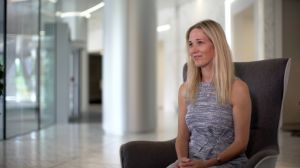Tenant Experiences Key to Return to Office, Employee Retention: Experts
Consultants from Lowe and HqO talk about what tenants want heading into 2022
By David M. Levitt December 21, 2021 9:00 am
reprints
Between the tenant and the landlord there is sometimes Lowe.
Lowe — not to be confused with the well-known home improvement chain Lowe’s — is a commercial real estate company based in Los Angeles that has been in business since 1972, when it started out as a financial workout firm. It does investment, development and property management, with a wide-ranging list of projects in its present and past, including many on the West Coast and some in the D.C. area.
But what Lowe is also about is guidance. Lowe, through its subsidiary Hospitality at Work, partners with tenants to help them recruit and retain workers by helping them create supportive environments. In this day and age, where working in an office is less a compulsion and more a preference — or not — that creation is more important than ever.
Daisy Gauck, a senior vice president at Lowe’s and the leader of Hospitality at Work, answered some questions from the Commercial Observer last week.
She was joined by Nora Hughes, lead product researcher for Boston-based HqO, one of many companies that offers landlords the opportunity to serve tenants through an app that can coordinate all sorts of individual wants and needs, from food and beverage to yoga and wellness. HqO is the technology provider for Hospitality at Work.
Their comments have been edited for brevity and clarity.
Commercial Observer: So Lowe is a conventional real estate company, but it also helps tenants maximize the utility of their space and keep their employees happy?
Daisy Gauck: Yes, Lowe is a national real estate company that acquires, develops, and manages real estate. And, on the management side, we do provide different experiences for tenants in order for managers to increase renewals and absorption, but also so that we can partner with our tenants and help recruit and retain their employees.

Explain to me exactly what it is that you do?
Gauck: I’m a senior vice president for Hospitality at Work, which is Lowe’s subsidiary commercial operating company, and I oversee the company as well as the tenant engagement aspects of our commercial properties. So, for tenant engagement, it includes any programming, and we have a team of experience managers who do the programming.
So, we’re overseeing them, supporting that program, and it also to some degree includes customer service training and designing services so that we can accommodate the programming.
What exactly is an “experience manager”?
Gauck: An employee on the property management team but who has a distinct job to interact with tenants, and provide services and programming. We sometimes call it, “the face of the building.” It’s somebody who sits, typically in the lobby area out front, so there’s a high interactive with the tenants and the guests.
It says on your website that you “create a high-touch tenant engagement platform that has seen tenant satisfaction and NOI increase year over year, benefiting both tenants and institutional clients.”
Gauck: That is our goal, and what we have seen in the years of doing this program.
How do the two of you work together?
Nora Hughes: My role is as a researcher to find out how users engage with our [HqO app]. We measure the expectations of tenants at Lowe buildings, and how that might impact what the tenants perceive Lowe as doing.
Why I got interested in this topic was a lot of our customers have an experience management program or are thinking about adding one because they see that it increases the value of the asset, and they want to do so by engaging tenants.
So Daisy and her team are users of our products. They help set up the content and tools that tenants can then view. And we partner together to understand what data comes back, and how we can make efficiencies. So, I do a lot of work interviewing folks from Daisy’s line of work, across our customer base.

I guess you can both answer this question. What changes do you see the pandemic as having brought about in how tenants relate to landlords?
Gauck: I think that tenants’ expectations of what they want out of the office have increased. Employees may have expected their employer to provide amenities and services — for example, happy hours or exercise. Now there is a push from tenants to have the building provide that because not everybody in the office may need that; they may be working from home, and it’s not a thing for them to do.
So tenants are looking for the owner or the building manager to provide more of the experience and the community building for their employees, rather than doing it themselves.
And I also think the pandemic has accelerated technology. It was certainly a topic that we were all working with prior to the pandemic, but it has accelerated usage of it. We can now reach our tenants wherever they are. And communicating with them through building signage or site-specific marketing or communications can now be done wherever they are at via mobile phones through the tenant-engagement app.
Hughes: I think it’s about how to ensure that employees stay engaged. We see articles about “The Great Resignation,” and employees wanting to work from home, but their employer requires them to be in the office, and everyone’s still figuring it out.
One of our customers has an experience manager, and she set up chair massagers that tenants could book, and they sold out so fast that she added additional slots. So, if someone who works from home a few days a week says, “I’m going to go in for a day so I can get a massage, that’s a wonderful experience.” They benefit, the employer benefits, and, for the landlord, it means people are in the building, adding value.
Another example is mobile music night, with local bands and artists, and putting together tenants from multiple buildings during the summer, [in an] open setup. An event where people could socialize and participate in. So even for folks who weren’t coming back to the office regularly, they choose to go in that day and be with their co-workers at this after-work event.
What do you think is going to stay once we get beyond the pandemic? What sort of things are going to become permanent?
Hughes: There’s an employee expectation of flexibility, in that I work from home a few days a week. I think employees are going to continue to demand that.
The other thing would be wellness. That’s not a trend, it’s already a thing. Employees are already looking to their companies to support their wellness. As an employee, I might actually care about my landlord and whether they are involved in ESG [best practices in supporting the environment, social issues and corporate governance] or community impacts.
Gauck: I’ll add to that. If you look at the early 2000s, landlords were providing capital to provide hard amenities — the bocce court, etc. Then, about five years ago, the impetus became the community, which provided the birth of the experience manager, the building codes, all of the programming and events that incentivize people to come back into the office.
And I do think the trend going forward is going to be both of those, with a sense of wellness.
So, looking at how the fitness center opens up to outdoor space. Or, if you’re programming an event, doing it with sustainability in mind. People want to understand that their building is safe and that there’s a healthy aspect about coming to the building.
One other thing, we did a survey this fall through our app and it reaffirmed that people are social beings; they miss the friendly faces, they miss being around other people. So, when you ask them, “What are you willing to come back to the building for? They really wanted food choices, variety and the surprise. They like the suspense of not knowing what’s coming next, or what the next food truck is.
Food was the top of the list. Next it was social, and that included events. Things like spin classes. They wanted not just to return to the gym, they wanted to return to fitness classes or the walking classes. So there’s a social element that’s a little bit different there.
And, third, they wanted opportunities for connection. Those are things that people said that, if they are working in a hybrid or flexible work environment, those are things they would come into the office for, and they’re not necessarily there now.
What do you think landlords and developers need to be thinking about as we enter the post-COVID period?
Gauck: I would say communicate not just with the lease signer or office manager, but communicate with all of the employees, or a large percentage of them. And they need to be incentivizing people to come back into the office by saying, “We provide a healthy place for people, so come and enjoy it.”
Hughes: I would add that they need to be thinking about what they are providing. It’s not enough to set it and forget it. Even though a lease might be 10 years, you see more and more tenants demanding better terms, looking for remote work, understanding how their health is being impacted every single day. Make the office someplace people want to be, in addition to being paid well.
Gauck: Nora really hit on it. It’s partnering for the future. The property management firm or the landlord needs to make sure they are partnering with their tenants, to help them. You need to be able to provide for them.
Nora, what is HqO’s viewpoint on what is the office that works in this day and age?
Hughes: The first thing is understanding what employees need. Landlords need to communicate with employees, to understand how those individuals are using the building. Are they attending those fitness classes, are they selling out all the Diet Coke? It’s something small, but understanding how employees are experiencing the workplace is the first step to understanding what can be done to improve it.
Every move is going to be a bit different, every employee is different, but by gathering data and asking questions about what people are needing, and testing out what people may need more of, you can start to come out with the right programs.
The third thing is using that data. An example might be you are trying to understand retention, and understanding there are certain events that accrue to that tenant’s company. Knowing what workers are most interested in, then checking in that they are engaging. And then asking afterward how it went. And reporting back to the lease signers. Show how a company added value.
This interview originally appeared as part of a Tenant Talk newsletter. Please consider signing up for Commercial Observer’s newsletters.


![Spanish-language social distancing safety sticker on a concrete footpath stating 'Espere aquí' [Wait here]](https://commercialobserver.com/wp-content/uploads/sites/3/2026/02/footprints-RF-GettyImages-1291244648-WEB.jpg?quality=80&w=355&h=285&crop=1)

